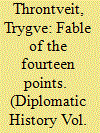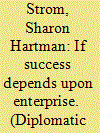|
|
|
Sort Order |
|
|
|
Items / Page
|
|
|
|
|
|
|
| Srl | Item |
| 1 |
ID:
106825


|
|
|
|
|
| Publication |
2011.
|
| Summary/Abstract |
In 1944, the State Department created the Division of Public Liaison (DPL) with the ambitious aim of making the Department "an instrument of the American People." The DPL represented a formal structure for creating relationships with representative groups of the American public. An analysis of the DPL offers valuable insights into how the State Department worked with and perceived American public opinion with respect to the development of foreign relations. While the DPL was created to develop a two-way relationship between the Government and the American public, Cold War bureaucratic and structural tensions significantly altered and reduced the DPL's role by 1953. Nevertheless, the significance of the DPL is not that it failed in its attempt to create a two-way relationship with the public, but that such an attempt was made at all, and that for a brief period at least, it showed great promise.
|
|
|
|
|
|
|
|
|
|
|
|
|
|
|
|
| 2 |
ID:
106824


|
|
|
|
|
| Publication |
2011.
|
| Summary/Abstract |
For decades, scholars have turned to Woodrow Wilson's Fourteen Points address of January 8, 1918, to explain his vision for a new international order after World War I. And for decades, one particular phrase has been closely linked to that vision: "self-determination." The phrase, however, appears nowhere in Wilson's address. Moreover, it is often shorthand for "national self-determination," connoting an ethno-nationalist political ideal Wilson never held. Rather, Wilson idealized self-government: the right of all to help direct their society's public affairs. By 1918, Wilson sought to promote both national and international self-government through a deliberative League of Nations, equipped to accommodate changes in an increasingly interdependent global society. Prejudiced though he was, Wilson envisioned an egalitarian League, with adequate sovereign powers to advance justice within and among nations. Though Wilson poorly communicated this radical yet pragmatic ideal, it was his late abandonment of pragmatic compromise that prevented U.S. League membership. That outcome, despite its contingency, has limited American views of the nation's global role ever since.
|
|
|
|
|
|
|
|
|
|
|
|
|
|
|
|
| 3 |
ID:
106823


|
|
|
| 4 |
ID:
081578


|
|
|
| 5 |
ID:
106827


|
|
|
|
|
| Publication |
2011.
|
| Summary/Abstract |
Historians have long recognized that the 1977-8 debate surrounding the Panama Canal treaties constituted a formative moment in the history of the New Right. By closely analyzing the arguments both for and against the treaties, Natasha Zaretsky contends that the debate crystallized a broader struggle between two articulations of U.S. nationalism after Vietnam. Supporters believed that the treaties signaled the development of a post-Cold War, post-Vietnam framework for U.S. foreign policy, one that would reinsert moral considerations into the realm of policymaking. Meanwhile, opponents believed that what they called the "giveaway" of the Canal was symptomatic of a larger pattern of American retreat in the wake of military defeat in Vietnam. The essay traces the contours of the debate among members of the Carter Administration, Congress, grassroots organizers, and ordinary men and women.
|
|
|
|
|
|
|
|
|
|
|
|
|
|
|
|
| 6 |
ID:
106826


|
|
|
|
|
| Publication |
2011.
|
| Summary/Abstract |
It may finally be possible after more than 35 years of debate to form a consensus as to what John McNaughton really believed concerning U.S. involvement in Vietnam and when he believed it. The recent discovery of a diary in the possession of his family allows for an unfiltered look at his thoughts regarding the administration's commitment. This personal and confidential journal clarifies McNaughton's views and in doing so comes down strongly on the side of the recollections of his colleagues in government who contemplated, debated, and anguished over the issue with him.
The log commences on January 1, 1966 and concludes in late April, 1967, just three months prior to the death of McNaughton, his wife, and their younger son in a plane crash. Within its 181 pages are John McNaughton's thoughts about the various issues on which he worked and the individuals with whom he dealt inside the Johnson White House, State Department, and Pentagon. The Vietnam passages among the 107 separate entries document his consistent and persistent opposition to U.S. policy.
|
|
|
|
|
|
|
|
|
|
|
|
|
|
|
|
| 7 |
ID:
081579


|
|
|
| 8 |
ID:
081580


|
|
|
|
|
|
|
|